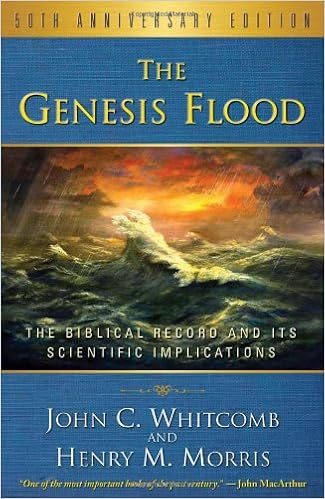The
inerrancy movement led to the Chicago Statement generated by the International
Council on Biblical Inerrancy (ICBI). To
get the background read Part 1.
Walter
Bradley, former Head of the Department of Mechanical Engineering at Texas
A&M, wrote a very influential paper “The Trustworthiness of Scripture in
Areas Relating to Natural Science” which abandons Creation In Six Days (CISD),
Young Earth Science (YES) and the Global Flood.
Unfortunately, Bradley claimed in another work (Three Views on Creation and Evolution) that bacteria death is a
problem for traditional creation. Not
so, as Andrew Kulikovsky explains:
However, this is a straw-man
argument. To be frank, it is common courtesy to learn what people actually
teach before criticizing them (but to be fair, the choice of creationist
spokesmen might not have given him the chance, at least as far as the book was
concerned). The major creationist organizations like Answers in Genesis and the
Institute for Creation Research have never taught that plants, microbes or
individual cells didn’t die before the Fall, but only nephesh (soul) creatures.
Our
review of Three Views on Creation and
Evolution can be found here.
The
companion book to the Chicago Statement on Hermeneutics was Hermeneutics, Inerrancy, and the Bible
(1984). In that book, Bruce Waltke
states, "... many Evangelicals err egregiously against the text [Gen. 1:1
- 2:3] by reading it as a scientific treatise. ... it is not history in the
proper sense of that term because no man was present to record the events at
the time of creation." [1] This is
not a real stumbling block for Orthodox Protestants who take Genesis as
Historical Narrative (OPGHN, "opgane"). God was present and active during Creation
Week. The Lord communicated with Adam in
the cool of the evening (Gen. 3:8). [2] Furthermore,
it's very reasonable that Adam himself wrote the early part of Genesis with
Moses as editor. In 2001 Waltke said
this,
The days of creation may
also pose difficulties for a strict historical account. Contemporary scientists almost unanimously
discount the possibility of creation in one week, and we cannot summarily
discount the evidence of the earth sciences.
Now
we can clearly see that the Slippery Slope Syndrome is real. Bruce Waltke (formerly at Reformed
Theological Seminary - Orlando) now favors theistic evolution and warned
evangelicals that rejecting evolution earns the label “cult.”
Once
believers see that the Deluge really happened, a young earth is obviously the
best option. Consider these timely words
from Henry Morris:
...
the whole geological-age system is based squarely on the philosophy of
uniformitarianism ... the actual data of the geologic column can be explained
at least as well in terms of recent catastrophism ... [3]
Morris
also points out that widely accepted dating methods deserve closer scrutiny:
...
the few physical processes that seem
to point to an old earth (e.g. uranium decay) in terms of the uniformitarian
assumptions on which they are based will show that these assumptions are not only
unproved but are also untestable and unreasonable. All the real
history we have (that is, written human records) goes back only a few thousand
years. [4]
YES - Young Earth Science is
a great book that defends a youthful planet from History and Science. This work documents numerous natural
processes that indicate a young earth.
A
Biblical WorldView requires us to take a strong stand on Genesis because Jesus
did as well (Mk. 10:6, Mk. 13:19, Lk. 11:50,51). Genesis and true Geology do not
contradict!
Beloved, while I was making
every effort to write you about our common salvation, I felt the necessity to
write to you appealing that you contend earnestly for the faith which
was once for all handed down to the saints. ... It was also about these men
that Enoch, in the seventh generation from Adam, prophesied, saying,
“Behold, the Lord came with many thousands of His holy ones" ... In the
last time there will be mockers ... But you, beloved, building
yourselves up on your most holy faith, praying in the Holy Spirit ... And
have mercy on some, who are doubting ... (Jude vv. 3, 14, 18, 20,
22)

Notes:
1) Hermeneutics, Inerrancy, and the Bible
ed. by Earl Radmacher and Robert Preus (Zondervan, Grand Rapids, MI, 1984), p.
108.
2)
Bing Crosby even sang a song about it, "Shore! said the dinosaur."
3) Radmacher
and Preus, p. 345.
4)
Ibid., p. 346, emphasis in original.




